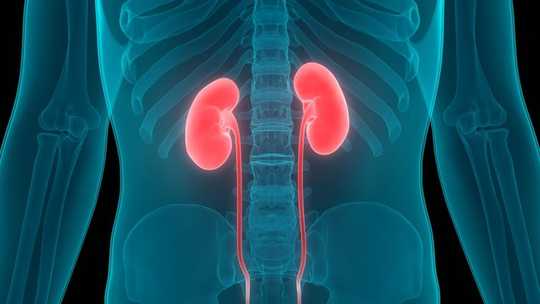
If you have high blood pressure, smoke or have diabetes, you’re at risk of chronic kidney disease. from www.shutterstock.com
A 42-year-old man – a father, a husband, a son – has come to the emergency department with a splitting headache. It’s been there for months, slowly getting worse. Today it’s unbearable.
He has no significant past medical history to explain the headaches and takes no regular medications. But he smokes and his blood pressure is sky high – 210/100 mmHg (good blood pressure is considered under 120/80 mmHg).
A series of investigations including blood and urine tests reveal significant kidney damage – stage four chronic kidney disease. Stage five kidney disease would mean he needs dialysis or a kidney transplant. This is serious.
Kidney disease is silent. Currently one in ten Australian adults have evidence of chronic kidney disease, with many unaware of it. It’s not until 90% of kidney function is lost that symptoms become apparent.
Get The Latest By Email
While symptoms like nausea, loss of appetite, lethargy and poor concentration are hallmarks of kidney failure, they are quite non-specific. Most people will have had these symptoms at some stage.
Fluid retention - swollen ankles and puffiness around the eyes - can be a marker of kidney disease. That’s because the kidneys are key to regulating fluid in the body and a diseased kidney cannot do that as efficiently.
Doctors confirm kidney disease using a blood and urine test. The blood test (serum electrolyes) gives you a “percent of kidney function”. And the urine test (urinanalysis) tests for blood and protein in the urine, markers of damage and inflammation.
What happens when your kidneys don’t work well?
Kidneys are responsible for removing fluid and waste from your body that accumulate each day.
But when kidney function declines, fluid accumulates in the body. So, your legs can swell, and fluid can build up in the lungs, making it difficult to breathe.
Impaired kidneys also mean you cannot efficiently get rid of waste products, so these accumulate too. Such toxins in the body account for much of the symptoms of fatigue, nausea and loss of appetite.
Loss of kidney function and the build-up of fluid may lead to high blood pressure, which in turn may further speed up decline in kidney function. High pressures pulsating through the kidney damages their delicate filters and cause scar tissue to form.

Loss of kidney function can lead to high blood pressure, which in turn can further speed up kidney disease. from www.shutterstock.com
People with chronic kidney disease are 20-times more likely to die from a heart attack or stroke. So, many people will die from heart disease before reaching end-stage kidney disease, the final stage of chronic kidney disease in which the kidneys no longer function well enough to meet your body’s daily needs.
When healthy, kidneys secrete the hormone erythropoietin (or EPO), which stimulates red blood cells to form. But as kidney function declines, production of this hormone is impaired and anaemia (a low red blood cell count), follows. So, patients need to be injected with EPO to restore their red blood cell count.
The kidneys are also pivotal in maintaining calcium and phosphate levels in the blood. As phosphate builds up, severe itchiness can develop; calcium levels drop and, without attention, this can lead to fragile bones.
Who is at risk?
Kidney disease is related to and caused by a number of different factors and conditions. As many as one in three Australians have at least one risk factor for chronic kidney disease.
Indigenous Australians are at risk with this risk increasing the more remotely they live. People with a family history of kidney disease are particularly vulnerable to it. Diabetes, high blood pressure, smoking, obesity, high cholesterol, heart disease, stroke and being over 60 are additional risks.
The number of people with chronic (long-term) kidney disease is forecast to increase by 60% by 2020, largely due to diabetes and obesity becoming more common.
Anyone who has had an episode of acute kidney injury is also at risk of later developing chronic kidney disease.
Less common causes of kidney disease are inflammation of the kidney, or glomerulonephritis. We don’t known what causes many forms of glomerulonephritis. But sometimes an infection triggers it.
For instance, while streptococcal infection that leads to glomerulonephritis is rarely seen in non-Indigenous people, this is a significant concern in Indigenous Australian children living in remote communities, with 15-20% suffering from it.
In other cases, someone’s own immune system damages the kidney tissue (an autoimmune disease) to cause glomerulonephritis. This may be triggered by an infection such as hepatitis B or C or from a yet unidentified source.
Taking certain medications for a long time can cause or hasten progressive kidney decline. That’s what happened with Bex, the painkiller popular in the 1960s, advertised widely with the slogan:
Have a cup of tea, a Bex and a good lie down.
Bex was ultimately associated with serious kidney injury (and cancer) and is no longer in use.
Anti-inflammatory medications are the current curse of people with kidney disease as they restrict blood flow to the kidney, possibly leading to acute kidney failure.
Other less well known causes for kidney disease include the growth of cysts on the kidneys (polycystic kidney disease), congenital abnormalities of the kidney or urinary tract and damage due to the backward flow of urine into the kidneys (reflux nephropathy).
How is kidney disease managed?
Chronic kidney disease cannot be cured. And once started, it’s difficult to halt its progression. So, awareness of kidney disease and its early detection offers the best opportunity to alter it course.

The number of people needing dialysis in Australia is forecast to increase. from shutterstock.com
Making lifestyle changes including losing weight, stopping smoking, controlling blood sugar levels and making healthy dietary choices cannot be emphasised enough as these factors slow progression of kidney disease, mainly through improved blood pressure control.
Reducing levels of protein in the diet may slow disease progression. However, people can have trouble sticking to a low-protein diet.
People with chronic kidney disease also need to be monitored, not just for declining kidney function but also so they don’t develop complications such as anaemia, bone disease, malnutrition and heart disease.
Dialysis or a transplant is the only hope for some
Concern of progressive kidney decline to end-stage kidney disease is real. It’s at this point that some people will receive dialysis or a kidney transplant, which is estimated to cost Australia A$1 billion a year.
And the number of people requiring dialysis or a kidney transplant is forecast to increase by 60% by the year 2020.
Dialysis is needed when kidney disease has progressed to the point where toxins cannot be cleared from the blood and fluid builds up. A machine essentially cleans the blood of excess wastes and removes fluid. Although a lifesaving treatment, its demands and impact on quality of life are significant.
Compared to the general population, the life expectancy of people on dialysis is significantly compromised. The five-year survival on dialysis is only 46% - a much grimmer outlook compared to a lot of common cancers.
End-stage kidney disease can also lead to a kidney transplant. But there continues to be a shortage of donor organs. In 2015, despite 949 transplants being performed, over 1,000 people remained on the transplant waiting list. The median time to receive a transplant was 2.4 years then. An increasing demand coupled with static supply suggests this waiting time will increase substantially.
Transplantation improves both quality and quantity of life compared to those who remain on dialysis. However the life expectancy of people who have had a transplant still lags behind an age matched population. People who have had a kidney transplant are at increased risk of heart disease and cancer afterwards.
So, if you are the one in three Australians with at least one risk factor for kidney disease, discuss this with your doctor. It could save your life.![]()
About The AuthorS
Karen Dwyer, Deputy Head, School of Medicine, Deakin University and Ashani Lecamwasam, PhD student, Faculty of Health, School of Medicine, Deakin University
This article is republished from The Conversation under a Creative Commons license. Read the original article.
books_health







